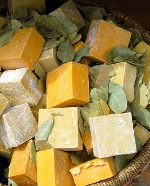Basic Soap Making Ingredients
Author: Mary Published Under: Home

Making your own soap is a very old and established process, which, over the last hundred years, has been largely lost on the average person, who instead turns to manufactured soaps. However, making your own soap is starting to regain popularity, as it is not only a very frugal act, but also allows you to know exactly what it is you are putting on your body. This way, you can use natural ingredients and scents, or even no scents at all.
Becoming a soapier is incredibly easy and uses utensils that are basic to most kitchens, however it is important to keep your cooking utensils separate from your soap making utensils. Once you have gathered up your basic soap making kit, the actual process of making soap is fairly simple.
The Soap
The most common type of soap made by a home soapier is either glycerin, whipped cream, or soap balls, with the process to make each of these different types of soap being similar and straight forward. Of course, there are many other types of soaps, which are not only easy to make, but also very inexpensive. For example, making your own laundry detergent is incredibly cost effective.
At its most basic, soap consists of soap flakes or glycerin soap pellets. Soap flakes are a grated hand milled soap, which can be grinded up or melted to make soap. Glycerin soap pellets are used to make a transparent soap and are melted. It is also possible to grate up base soaps made of glycerin or cream, provided they are unscented and natural, to make your own soap flakes/pellets.
Essential Oils and Absolutes
Another important ingredient when making your own soap is to use one or more essential oils, which is can not only be good for the body, but can also provide a very pleasant aroma. Often, citrus is a nice oil to start with, as it is very inexpensive and most people find it pleasant smelling. Due to its low cost, citrus oil is one of the more frugal choices for homemade soap.
When making whipped soap, it is also necessary to use sunflower oil and purified water. Natural colors can also be used, allowing you to further change the look of the soap.
Usually essential oils can be purchased in small batches, starting at 10 ml, which is enough to do a few batches of soap. When choosing your oils, much comes down to preference, but it is important to consider allergies and sensitive skin. There are even some that can have an impact if you are pregnant, so some caution is needed.
Another option is to use absolutes, which are similar to essential oils, but more concentrated. Absolutes cost more and are typically purchased in smaller quantities.
Make sure to use your soap within 18 months.